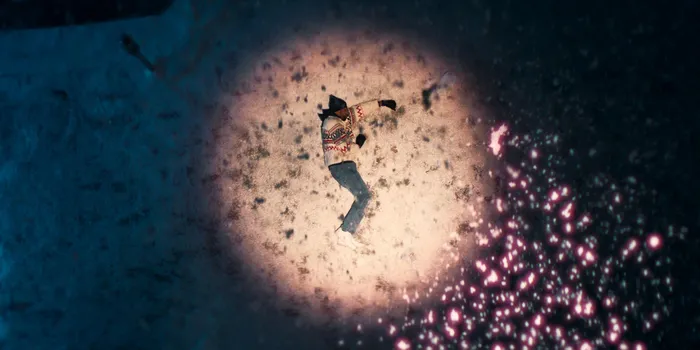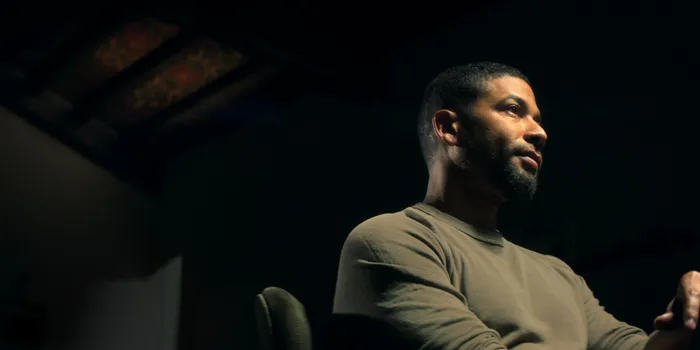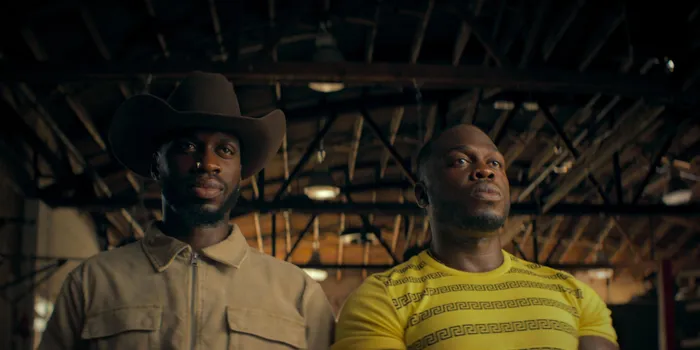Documentary rehashes 'Empire' star Jussie Smollett's downfall, but fails to rewrite the scandal

A re-enactment of the hate crime incident in 'The Truth About Jussie Smollett?'
Image: Courtesy of Netflix © 2025
I’ve watched my fair share of phenomenal to awful documentaries. Generally, I’m drawn to the subject matter. When it includes never-before-seen material, coupled with unheard-of testimonies, it heightens interest.
Some of these offerings had me flitting from being in an emotional chokehold to utter shock. They include “Surviving R Kelly”, “Allen vs Farrow”, “Phoenix Rising”, “The Menendez Brothers”, “My Name is Reeva”, “Senzo: Murder of a Soccer Star”, “Tracking Thabo Bester, “The Tinder Swindler” and even “Super/Man: The Christopher Reeve Story”.
Of course, these are simply the ones at the top of my head.
My point is, when the subject matter is so compelling, there is an eager audience on standby.
That doesn’t mean that peddling Googleable information and slapping a clickbait headline will work in favour of the documentary.
It needs to have gravitas. It just needs to have more …
When P. Diddy was incarcerated, the documentaries around him were pushed onto the small screen thick and fast. It was simply a numbers game at that stage. Public interest beckoned for content, and filmmakers were keen to deliver.
However, some of them were a waste of time and are not worth mentioning.

Jussie Smollett in 'The Truth About Jussie Smollett?'
Image: Courtesy of Netflix © 2025
This brings me to “The Truth About Jussie Smollett?” on Netflix. I recall the alleged hate crime incident - and subsequent fallout - a few years ago.
At the time, he was riding the crest of unprecedented success as Jamal Lyon, a lead on “Empire”, where he was also given the reins to direct an episode.
A music deal was on the table as well, and his future, overall, was looking promising. A rising star and an LGBTQ activist, he was celebrated as a media darling.
Then came the life-changing event where Smollett, in the early hours of January 29, 2019, was allegedly attacked by two masked men, who, aside from making racist and homophobic slurs, placed a noose around his neck.
He was returning home from having purchased a Subway sandwich.
In his statement to the police, he noted his attackers were caucasian, going by what he could see through the slits of their masks.
It wasn’t long before the news grabbed headlines and Smollett received unwavering social media support from John Legend, Ariana Grande, Kamala Harris, Viola Davis, Janelle Monáe, Steve Harvey and even Donald Trump.
“Empire” creator Lee Daniels also shared an emotional post of solidarity at the time.
But what started as an unforgivable hate crime quickly snowballed into a disturbing narrative.

Akimbola (Bola) and Olabinjo (Ola) Osundairo in 'The Truth About Jussie Smollett?'
Image: Courtesy of Netflix © 2025
Smollett went from victim to orchestrator as the Chicago police, who were being pressured from the higher-ups to resolve the case due to unrelated racial tensions in the city, took a closer look at the evidence.
There were a few inconsistencies in his story that were red flags for law enforcement, one of which was his returning with an unruffled sandwich bag.
In his recollection of events, Smollett doesn’t waver from his original story. He is also aghast at how he was vilified.
Meanwhile, the police concluded that the Nigerian Osundairos brothers, Akimbola (Bola) and Olabinjo (Ola), were paid by Smollett to stage the whole assault. The actor claims it was a payoff for drugs.
The testimonies by former superintendent Eddie Johnson, former Chicago police officials, journalists, legal commentators and two critical eye-witnesses, offer polarised views of the reported “hoax hate crime”.
Directed by Gagan Rehill and produced by Raw TV, who are behind “The Tinder Swindler”, this documentary aims to rewrite history.
In trying to set the record straight - not that the new feedback does much of that, to be honest - the director presents the narrative most are au fait with and then artfully casts aspersions of widespread corruption within the police force, which tainted the investigation and, in so doing, resulted in the ruinous fall of Smollett.
Will this documentary change public perception? I doubt it. But instead of dwelling on the past with inconclusive evidence, perhaps the smarter play might have been a project celebrating his talents and moving beyond the pain of the scandal.
This lacklustre attempt failed to captivate, appearing as a desperate grasp at straws to generate interest where none existed.
Rating: * signals a poorly executed film with minimal redeeming qualities.
Related Topics: